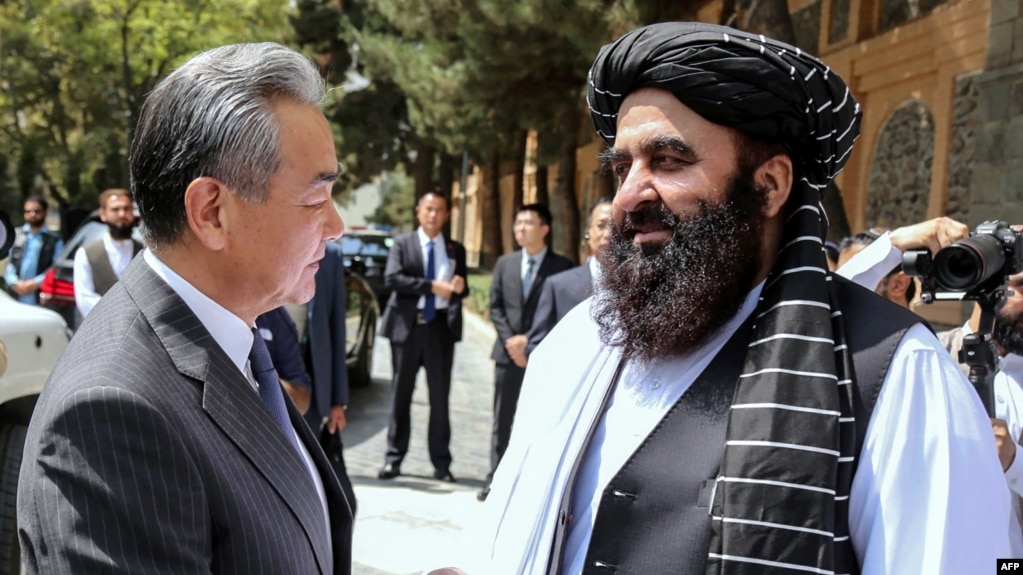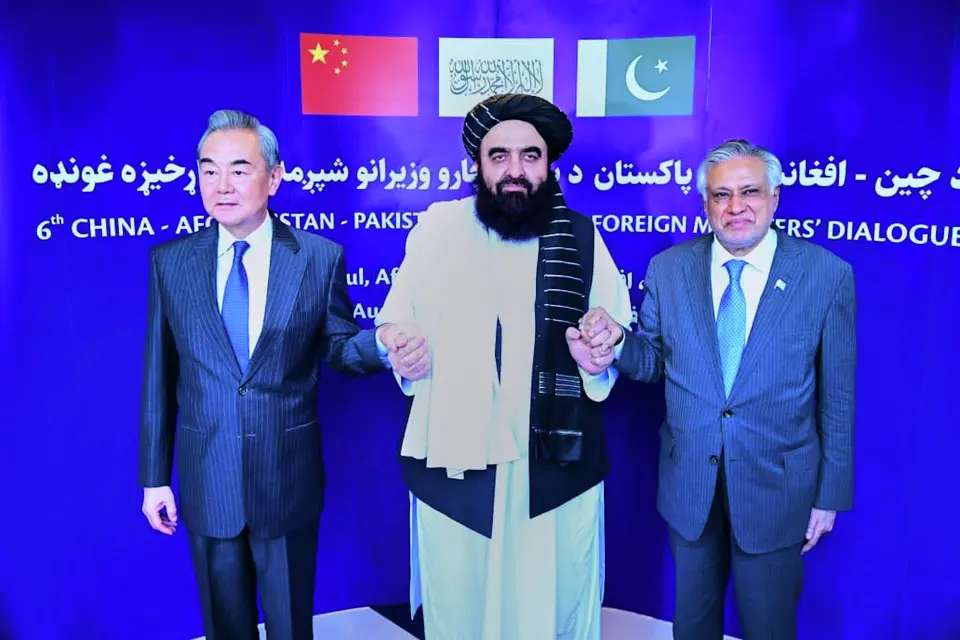Review of Afghanistan developments
The Trilateral Summit involving Afghanistan, Pakistan, and China was initiated by China to enhance regional collaboration and address shared challenges. This platform was established prior to the Taliban’s rise to power, originally referred to as the ‘Trilateral Cooperation Mechanism.’ However, following the collapse of the republic and the Taliban’s ascension, Beijing, possessing a profound awareness of the situation in Afghanistan, prioritized the reactivation of this platform with increased urgency and seriousness. In this context, the sixth Trilateral summit among the foreign ministers of Afghanistan, Pakistan, and China took place in Kabul on Wednesday, 10 August 2025.
Chinese Foreign Minister Wang Yi and Pakistani Foreign Minister Mohammad Ishaq Dar visited Kabul for a collaborative meeting with their Afghan counterpart Amir Khan Muttaqi, where they addressed key topics including security, economic matters, transit, and counter-terrorism issues.
Goals of the Sixth Trilateral summit
According to reports, the primary aim of the meeting was to evaluate prior decisions and explore new opportunities for trilateral collaboration in the political, security, and economic sectors. During their discussions, the foreign ministers highlighted the importance of developing economic and trade infrastructure, particularly the extension of the China-Pakistan Economic Corridor (CPEC) project into Afghanistan, with the goal of establishing new transit routes and linking the country to Central Asian markets. They also addressed the need to strengthen cooperation in the fight against transnational terrorism, particularly in countering the threats posed by terrorist organizations such as the Tehreek-e-Taliban Pakistan and the East Turkestan Islamic Movement (ETIM), which represent significant security challenges for China.
Amir Khan Muttaqi, the Foreign Minister of the Taliban administration, remarked during the meeting that Afghanistan’s foreign policy has shifted its focus and that the nation no longer aims to concentrate exclusively on security matters, but instead aspires to establish itself as a regional economic hub.
Chinese Foreign Minister Wang Yi emphasized the importance of enhancing political collaboration between Afghanistan and China, particularly in the realms of economic and mining partnerships. As stated by the Foreign Ministry of the Taliban government, China has urged Kabul to officially participate in the Belt and Road Initiative and has guaranteed that Beijing will implement tangible actions in the mining sector within Afghanistan. A statement from the Chinese Foreign Ministry indicated that Wang Yi called on the Taliban government to seriously address Beijing’s concerns regarding ‘terrorist forces’ and to take action against them.
Pakistani Foreign Minister Mohammad Ishaq Dar regarded the meeting as a chance to enhance collaboration among the three nations, stating that Kabul and Islamabad have embarked on a new journey of cooperation that has the potential to bolster regional stability. He urged Afghan government officials to implement tangible and verifiable actions against terrorist organizations, including the Tehreek-e-Taliban Pakistan (TTP) and the Balochistan Liberation Army.
China’s golden role in the Trilateral summit
Following the Taliban’s rise to power, several regional platforms concerning the Afghan situation emerged, one of which was the Trilateral summit involving Afghanistan, Pakistan, and China. What set this platform apart from other regional efforts was its emphasis on addressing the Afghan-Pakistani conflicts. The perceptive Chinese recognized Afghanistan as a favorable opportunity to assert their influence following the withdrawal of NATO and the United States, understanding that, unlike in previous times when their ability to engage in Afghanistan was restricted, the present moment is ideal for revitalizing the trilateral summit.
The Trilateral Summit Platform involving China, Pakistan, and Afghanistan, under the new Chinese framework, emphasizes three key areas: the establishment of political trust, counter-terrorism efforts, and trilateral collaboration concerning the Belt and Road Initiative (OBOR) and the China-Pakistan Economic Corridor (CPEC). Although the progress of this trilateral summit has been gradual, there are indications of its effectiveness. Over the past year, the level of tension between Afghanistan and Pakistan has notably decreased, with relations transitioning from a state of impasse to a concerted effort aimed at problem resolution and enhanced economic interactions. The most evident illustration of this development is the improvement in diplomatic relations and the exchange of ambassadors between Afghanistan and Pakistan, which was sanctioned at the previous trilateral summit held in Beijing and executed prior to the sixth trilateral summit.
One of the most significant challenges in the current relationship between Afghanistan and Pakistan is the matter of the Tehreek-e-Taliban Pakistan, which has significantly impacted the ties between the two nations. The proposal to relocate members of the Tehreek-e-Taliban Pakistan is, in fact, a Chinese initiative that, according to certain Pakistani officials, has been the subject of multiple discussions. The Pakistani political government, which is currently facing political and economic crises, is supportive of this plan; however, the Pakistani intelligence agency, responsible for overseeing the Afghanistan situation, holds a contrasting perspective on the Tehreek-e-Taliban issue.
From the viewpoint of the Pakistani intelligence agency, the primary issue is not the presence of the Tehreek-e-Taliban Pakistan in Afghanistan; instead, it perceives the existence of this group in Afghanistan as the principal challenge. Consequently, relocating members of this group to different regions will not appease the ISI. This may explain why, despite occasional improvements in relations, the element of interference from Pakistan continues to hinder these relations, with the most recent instance being Pakistan’s hosting of a meeting for Taliban opponents in Islamabad.

China, recognized as one of the three major powers in the international system, is actively working to reduce tensions in its surrounding region, which is currently facing complex conflicts. Beyond the situation involving Afghanistan and Pakistan, Beijing has also taken steps to mediate between Iran and Saudi Arabia, successfully facilitating a thaw in relations between Tehran and Riyadh. Furthermore, the visit of Chinese Foreign Minister Wang Yi to India, a long-standing competitor of Beijing in the region, and the subsequent agreements reached with New Delhi exemplify China’s commitment to alleviating tensions in its vicinity. The Chinese leadership has realized that without a secure and stable environment, achieving growth and development on the global stage will prove challenging. Additionally, international relations experts suggest that having experienced significant economic growth, Beijing is now aiming to enhance its influence in the global political landscape to alter its geopolitical standing within regional dynamics.
The trilateral summit holds significant importance for Beijing for two primary reasons. Firstly, it is perceived as a measure of the efficacy of the nation’s foreign policy mechanisms in alleviating tensions. Secondly, and more crucially, the substantial investments made by China in the extensive China-Pakistan Economic Corridor (CPEC) project are facing considerable security risks. Consequently, Beijing is engaging in Trilateral summits with increased seriousness and at the level of foreign ministers following the withdrawal of the United States from Afghanistan.
The visit of the Chinese foreign minister to Delhi, along with his remarks to his Indian counterpart advocating for a “correct strategic understanding” and a partnership rather than rivalry between the two nations, may not only alleviate the prevailing mistrust between them but also serve as a significant step towards bolstering the security of Pakistan’s strategic ally and its multi-billion-dollar initiative within the country. A primary factor contributing to the ongoing insecurity in Pakistan is the enduring rivalry with India, with Balochistan emerging as a critical flashpoint due to the passage of the China-Pakistan Economic Corridor through the region.
Conclusion
The 6th Trilateral summit of the Foreign Ministers from Afghanistan, Pakistan, and China represents a significant advancement in enhancing regional collaboration, fostering economic growth, and improving security within the area. This gathering not only establishes a foundation for cooperation across various sectors but also illustrates the commitment of the involved nations to alleviate tensions and attain sustainable development.
It appears that the resolve of the three participants in the Trilateral summit is aimed at reducing tensions and advancing economic collaboration; however, the method for establishing enduring assurances will dictate the success of this initiative, which serves as a challenge for China’s foreign policy framework.
Related articles
China’s Capacity to easeTensions Between Pakistan – Taliban
The shift in Pakistan’s policy regarding the Taliban
The future outlook for the trilateral summit involving China, Pakistan, and Afghanistan hinges on the degree to which political trust is strengthened, regional collaboration persists, and economic and transit initiatives are executed as the cornerstone of regional unity. If these elements are effectively managed, it is anticipated that the trilateral summit will illuminate the previously overlooked aspects of Afghanistan-Pakistan relations.
The leaders of Afghanistan and Pakistan ought to take advantage of the opportunity presented by this influential neighbor and work towards a gradual approach to establishing harmonious relations and strategic collaboration. In the absence of such an environment, neither nation will be able to achieve its ambitious regional objectives, and their economic strategies will continue to be ineffective.
Follow us on social media

















